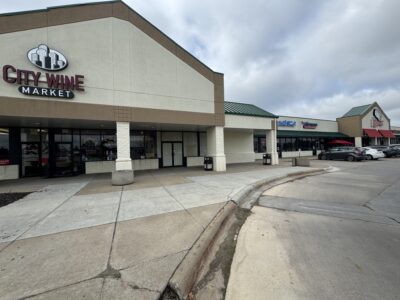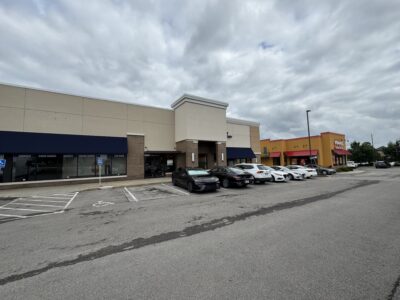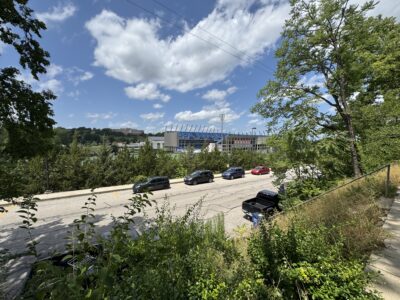
Tensions between city and county flare at Tuesday night’s meeting; city won’t inspect school district building projects
You know at a family reunion how your cousin throws a chair at you because of a dispute over the last deviled egg? I knew you did. Well, the Lawrence City Commission meeting on Tuesday kind of had that feel to it.
Certainly no chairs were thrown, but there was a good amount of tension between city and county officials, and just like at the family reunion, there was some history fueling it.
As I reported in Tuesday’s Town Talk, there was a dispute brewing between the city and the county over whether the city should waive about about $265,000 in sewer and water impact fees that the city is entitled to charge the county as part of its new Public Works facility in eastern Lawrence. Lawrence school district officials also were involved because they had a similar request to waive about $280,000 in building permit fees related to building improvements as part of the $92.5 million bond issue. There was some tension between city and school officials Tuesday, but it kind of paled in comparison to city-county issues.
Bottom line: City commissioners ended up waiving both sets of fees, but not until Douglas County Administrator Craig Weinaug delivered a lengthy commentary criticizing the city’s hesitancy to do so. In particular, Weinaug really was upset about a memo written by Lawrence City Manager David Corliss. That memo recommended that if the city waived the impact fees for the county, then city staff should negotiate with the county for “an appropriate level of consideration or compromise and direct staff accordingly.”
Upon reading that, Weinaug came to Tuesday’s meeting with six pages worth of testimony about how the county has helped pay for projects that directly benefit the city of Lawrence. Weinaug also issued a warning, of sorts.
“Requests between the city and the county and the school district should be considered in good faith based on whether the citizens we all serve benefit from saying yes to each other, not based on whether each body receives an appropriate quid pro quo,” Weinaug said. “To apply this as a new standard virtually assures that future opportunities to support each other will be much more limited than they have been in the past.”
It was clear Weinaug also was peeved by a statement in Corliss’ memo that said the county’s public works facility will be used “for work in the unincorporated county without substantial direct economic benefit to the city of Lawrence.”
Weinaug reminded city commissioners of several projects the county has or will contribute to that clearly have benefited Lawrence residents. They include: more than $6 million in expenditures on the South Lawrence Trafficway; more than $600,000 in improvements to 31st Street; $600,000 for improvements to the Kasold Drive bridge over the Kansas Turnpike; more than $1.7 million to help build Clinton Parkway in the 1990s; and recently more than $400,000 to help keep a major warehouse project by Berry Plastics in Douglas County after the city’s efforts to provide a site for the project became entangled in litigation.
As someone who has been paid to watch the City Commission for about 20 years now, it came as no surprise that there is tension between the city and the county over matters of joint funding. It is not hard to pick up on comments from city commissioners and from Corliss about how they don’t believe the county is paying an appropriate share for this or that. Funding related to the Lawrence-Douglas County Health Department has been a point of contention for years. Funding for the SLT interchange at Bob Billings Parkway has been a more recent one, and there are certainly others.
Some disagreements have been more concealed, it appears. It was revealed by Weinaug on Tuesday that the county was rebuffed in its request to get a portion of the former Farmland Industries property now owned by the city to expand the adjacent Douglas County Fairgrounds. Weinaug said Corliss told him the city would only consider it if the county was willing to pay for the property. That request by the county was never discussed by the City Commission in a public meeting, at least according to my records.
Corliss told commissioners that he certainly has his views on funding and equity issues between the city and the county, but he said Tuesday’s meeting probably wasn’t the time to reiterate them.
Regardless the tensions between the city and county rose to a new level on Tuesday. City commissioners weren’t pleased by it.
“This was one of the most embarrassing interactions I have been a part of in the last seven years,” City Commissioner Mike Dever said. “I felt like we were defending ourselves, the school district felt like it had to defend itself, and the county felt like it had to defend itself. The reason I am embarrassed is because we’re all here to serve the public.”
City Commissioner Jermey Farmer said he supported the fee waivers because they are the sort of assistance that “makes us a good partner.” He also indicated that all the governing bodies need to keep that idea of partnership close at hand.
“I think collaboration is not about being best friends,” Farmer said. “It is not about liking everybody you work with. It is about putting everything aside and working towards the best common goal.”
By the end of the meeting, both city and county officials were trying to accentuate the positive. They noted the county and city have worked together successfully on many projects and would continue to do so in the future.
Weinaug, who has been the county administrator for 22 years, compared the relationship to a marriage. He said it has been a good one where 99 percent of the time the two parties work out their differences. He noted this was the first time in his tenure that he had ever addressed the City Commission in such a manner.
“For a marriage of that long, having one public spat is a pretty good record,” Weinaug said.
Corliss largely agreed, although not with the terminology.
“I don’t consider it a spat,” Corliss said.
• As for the school board, the discussion wasn’t as lengthy, but school board member Shannon Kimball was direct with city commissioners about one point. She noted that the city waived the building permit fees for Bliss Sports as it builds the privately owned sports facilities at Rock Chalk Park. The city did so as part of an economic development grant. She felt like that set a precedent that the city should waive the fees for the school projects.
“Undertaking $92.5 million worth of projects to improve our schools quite directly impacts our community’s economic development,” Kimball said. “We’re talking about public-owned facilities here. We think we’re on equal footing, if not more deserving, of that type of consideration.”
Commissioners ultimately unanimously agreed to forgo the building permits fees for the school project. But the way they chose to do so creates questions about what happens next. City commissioners decided that city building inspectors will not inspect the school district projects. Superintendent Rick Doll said Tuesday night that the projects absolutely would undergo a building inspection.
School district buildings are required to meet a state building code. But it was unclear Tuesday whether there are state inspectors who will inspect the buildings, or whether the school district will now be responsible for hiring private inspectors.
If it is the latter, it brings up the question of whether the school district can hire private inspectors at a cost less than what the city was going to charge in building permit fees. If so, that brings up the question of why a private inspector would be cheaper than a city-provided service that has no profit margin built into its costs?
In other news and notes:
• Commissioners on a 4-1 vote also approved the rezoning that will allow a 27,000 square-foot farmer market-style grocery store to be built near Sixth Street and Overland Drive in northwest Lawrence.
Commissioner Terry Riordan voted against the plan, in part because he said he is very disappointed that the Bauer Farm development that the store will be a part of has changed so dramatically from its original idea. For years, the local development group — which is led by Lawrence businessmen Mike Treanor and Doug Compton — has touted the development as an example of new urbanism, which is the idea of creating places where people will live, work and play in a very walkable development reminiscent of a traditional urban center.
The idea for the project dates back to 2003, but over the years the concept has changed. What was approved Tuesday night included several design features typical of a suburban style shopping center.
“I saw new urbanism and that is what we were sold on in the beginning,” Riordan said. “I saw lots of neat things planned, and now they are all gone.”
Riordan even went so far as to say the city had been led down a “prim rose path.”
Developers disagreed with that assessment. They said the project did have to change to respond to the economic downturn and, frankly, far less demand for office space than they had expected. But they said the project still has a lot of the elements originally proposed. The development has a mix of uses with retail, arts activities with Theatre Lawrence, and residential with a retirement community and more living units planned for the future.
Dever also defended the project by saying it had far more sidewalks than was required by city code and estimated that it was a more walkable, pedestrian-friendly development than 95 percent of all shopping centers in the U.S.
All that was interesting, but more so was what commissioners had to say about retail development in general. The city in future months will take action on a large proposed retail center just southeast of the intersection of the SLT and Iowa Street.
Commissioner Bob Schumm reiterated his concern that the city is allowing too much retail development on south Iowa Street, and he predicted it will start causing problems for other areas of town.
“I’m deeply concerned about the excessive amount of commercial development we are putting along south Iowa Street,” Schumm said. “We are going to be completely out of balance before long.”
Commissioners also heard from some residents that the city was becoming overbuilt. Most notably, Kirk McClure, a professor of urban planning, again told commissioners that the city was allowing retail development at a rate far faster than what local retail spending could support.
But there was some visible pushback from at least one commissioner on that point. City Commissioner Farmer made it a point to remind everyone that McClure had predicted that when Walmart was built at Sixth and Wakarusa it would greatly damage the Dillons store across the street. But as Farmer noted, the Dillons store has since expanded.
“It doesn’t mean any of the projections on the retail market were wrong, though,” McClure said.
I’ll leave that for others to debate, but what does seem clear is that future retail discussions at City Hall are likely to be divided.







